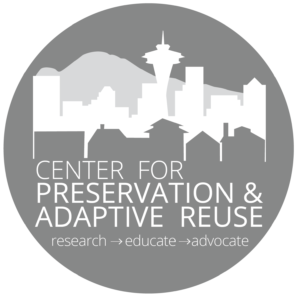Who we are
The Center for Preservation and Adaptive Reuse (CPAR) produces innovative research, advances knowledge, and promotes educational initiatives addressing the existing and historic built environment, recognizing its critical contribution to our sustainable future. We are an interdisciplinary group of educators, architects, planners, landscape architects, historians, anthropologists, museum specialists, engineers, materials scientists, and builders who are connected to, and collaborating with, a larger group of professionals and organizations to achieve our mission. Our work focuses on increasing awareness of the historical, social, cultural and environmental value of our built environment through research, documentation and analysis, planning, education and advocacy. CPAR was initiated in 2017 in the College of Built Environments (CBE) at the University of Washington, building on the college’s longstanding commitment embodied in the Certificate Program in Historic Preservation that dates to the 1980s.
What we do
The Center for Preservation and Adaptive Reuse (CPAR) produces innovative research, advances knowledge, and promotes educational initiatives addressing the existing and historic built environment, recognizing its critical contribution to our sustainable future. CPAR is based in the College of Built Environments at the University of Washington in Seattle.
Why Preservation and Adaptive Reuse?
Buildings are one of the largest and most expensive products of human action. They have cultural, social, historical and environmental value. Buildings of all types play a dominant role in our lives as a critical part of our human experience. They provide us shelter from the elements, provide places to work, sleep, eat, and play and affect us with their style form, color, materials, and space. As the embodiment of the historical narratives of our pluralistic society, buildings help us understand our past heritage and connect us to our present communities.
Buildings have a tremendous impact on the environment. In the United States, buildings are responsible for 76% of all electricity consumption, 41% of all primary energy use, 48% of all carbon (CO2) emissions, 60% of all raw material use, and 13% of all potable water consumption. Some of the most severe impacts occur when a building is destroyed. Of the 275 billion square feet of existing buildings in the United States today, nearly 2 billion square feet are demolished annually. An estimated 40% of demolition waste ends up in landfills. Thus, preservation and adaptive reuse must be part of any possible strategy for sustainability.
Research, Education and Advocacy
The Center for Preservation and Adaptive Reuse (CPAR) engages in a wide variety of projects in research, planning, advocacy and education to support our mission statement to foster preservation and adaptive reuse of our built environment. One current project in which CPAR is engaged is developing a comprehensive historic resources survey and inventory of the UW Seattle campus. Working with partners such as the City of Seattle, we are identifying and recording historic buildings, landscapes and features of the campus and entering the information into the city and state databases.
Another current project addresses historic unreinforced masonry (URMs) buildings that are in danger of being lost in an earthquake. The City of Seattle has assembled a policy committee to study the issue and make recommendations about how to retrofit these buildings, and together with the Preservation Green Lab of the National Trust for Historic Preservation, a team of faculty and students are working on solutions to identify the issues and opportunities for seismically retrofitting Seattle’s many unreinforced masonry buildings.
CPAR and the College of Built Environment has the goal of engaging more students of all disciplines in the many opportunities in preservation, sustainability and adaptive reuse. We are currently enlarging our curriculum offerings to include cross-disciplinary courses to support a new CBE Graduate Certificate Program in Historic Preservation that will be available university wide. This educational initiative will also bring together a wider range of faculty expertise and to broaden and diversify opportunities for students across the UW.

